
Atlas F1 GP Editor
You are likely to know that Vitantonio Liuzzi has dominated this year's F3000 championship, having scored an unprecedented seven wins. You may have read he has tested Formula One cars and that he has been linked with some teams for next season. You could even know about his particular dressing style. But who is Tonio Liuzzi in reality? David Cameron talked to the Italian driver about his beginnings in motor racing, about his F3000 season, and about his F1 future. Exclusive for Atlas F1
"I would have thought you'd want a whole suit like that," I smirked, goading him on.
"You are right," he considered, "if I walk into a room with a suit like this people will stop and say 'ah, here is Liuzzi'."
Tonio Liuzzi may not be famous in the streets of Milan just yet, but he is famous in the Formula One paddock, and this fame comes from two things: his outrageous dress sense and his blistering speed. After only four years in cars he is already knocking on the door of Formula One, and there are a lot of team bosses there are ready to open it for him. His personal sense of style is seen as a breath of fresh air in a paddock full of non descript drivers who have been PR-ed until they are opaque, and speed never goes out of style.
Liuzzi was born in Bari, the hometown of his mother, about 300 km south of Pescara, where his Sicilian-born father moved the family shortly after the birth. Liuzzi's father was a traveling salesman, selling all manner of goods for a company that supplies kitchen and bathroom linens, and Pescara was seen as a good, central location from which he could travel all around the country but still spend as much time as possible with his young family.
Like every Italian boy, Liuzzi wanted to grow up to be a soccer player, and spent most of his youth kicking a ball around with his friends in summer and skiing in the winter. Like every Italian man, he is convinced he would have been a great player if he had just kept at it, but as it turned out he found something else that he was much, much better at.
At the age of 11 providence smiled on Liuzzi in the form of an innocent invitation from a class mate to come and watch him in action at the local karting track. At that time he had never heard of karting he watched every Formula One race religiously, cheering for Nigel Mansell in the Williams every time he overtook someone, much to the chagrin of his Ferrari loving father but he said yes, and promptly found his life laid out in front of him.
That night Liuzzi went home transfixed, nagging his father incessantly until he agreed to take the boy back to the track on the weekend. "The first day we went to the track they wouldn't allow us to go on with rented karts, so he said "okay, I will buy this and that one kart for me, one kart for him", and there we started together. But after one week he realised it was just for me, because I was always driving, driving and pushing him to go to the track, and for him it was just a hobby, just to enjoy his time.
"I had just the karting and my school, because my parents were telling me if I didn't go to school it was over for karting it was a good excuse for them to push for school, but I was really just focused on karting! And that was my beginning; my father also liked it, because he had never done anything like this he had a passion for motorsport, but had never run a car or a kart like this, and then everything was different."
For the next four years his life went on thus: a compulsory drag through classes he had little interest in before he could get back out to pound around the track. At the age of 15 his father, worn out from all the miles he put in traveling for work, came home one day with an idea. "He said 'okay, why don't we start a karting business?'" Liuzzi recalls, involuntarily smiling at the thought. "We were quite well involved in karting, and it could have been a good future for me if I didn't have a career in karting (driving), or if I was bad at it, then I had an excuse to stop and run my karting team."
Liuzzi had already signed to drive with CRG Karts, the company he was to remain with throughout his whole karting career, and his contacts helped in the set up. "I had a job for my future, because my parents realised that school was not for me I mean I didn't want to become a doctor or a lawyer! Since karting went in my mind I forgot all the rest, and I said my future is in karting, in motorsport, so if I won't be a driver I'll be a mechanic or team manager or something for my team. So we said okay, let's start with this karting business."
His father was the salesman, but the junior Liuzzi ran every other aspect of the team; managing, tuning and repairing the karts, and talking to the drivers, of which there were usually seven or eight at any time; and he ran his team around his own burgeoning driving career. The team continues to this day, run by his family, and Liuzzi kept control of every aspect except sales himself until his car career started and the travel meant he could no longer be as active in the team as he wished.
"I was actually working in karting, with (British Karting manufacturer) Tim Gillard," Collins reflects on the fortuitous meeting, "and I saw this strange guy with funny clothes walking around, and I said he's the guy with that fancy helmet. And I saw that fancy helmet in the lead of some races, so I took a bit more interest."
"The first time he was coming by, he said 'hello, I'm Peter Collins'," Liuzzi notes, "and he started telling me something about the race. He told me he was Peter Collins, but I didn't know who he was, because in that period if you told me it was Ron Dennis or Norbert Haug I wouldn't have known he was anyone, because I wasn't at all involved in motorsport. For me karting was my life my dream was to be a karting World Champion and that was all I didn't know at all what was the right way to grow up in formula cars."
The pair spoke whenever their paths crossed, and two years later at the European Championships Liuzzi's performance showed Collins that he was the real deal. "I heard there was a big commotion in CRG because there was a new chassis for everybody, new engines," Collins remembers, "and he (Liuzzi) wanted to drive that old engine, that old chassis and everybody said 'no, don't do it you're crazy.' So anyhow, my driver was in the same class, and the racing started and he just" - Collins slaps one hand far forward on top of the other - "on the worst tyres for that weekend, he just disappeared.
"He won by 100 metres in a kart that they told him was no good, and with an engine they told him was no good. So then I thought okay, this is somebody who has quite a strong self belief, and then I saw the funny fishing hats and the shorts and whatever and I thought okay, he's original, he's different. And then we met a little bit and I liked the fact that he didn't know who I was, that he wasn't impressed by anything to do with motor racing he was there because he liked driving. And I loved the way he drove his karting technique was just fantastic, for me."
Collins tried to convince the Italian to move up into cars, which took quite some doing Liuzzi had been able to buy a Mercedes from the money he had earned in karting, and cars meant leaving behind everything he knew.
Collins: "When we actually talked about working together he said 'I'd like to work with you' - I said 'but I don't have any money', and he said 'yeah, but I'd like to work with you'. I said 'I'm not good at getting money' which he now knows! and he said 'yeah, but I want to work with you', and I said 'yeah, but if I don't get any money maybe you won't get to go into cars, what will you do then? Your career will be destroyed', and he said 'I'll keep driving karts.'"
Liuzzi: "Yeah, it's true I mean my life was karting, so I thought okay, if you want to try and make something with cars we can, and if it doesn't work out I can go back to karts, because I was really happy in karting."
The results of 2001 were enough to draw the attention of Dr Helmut Marko, the man who was running the Red Bull Junior Team in Formula 3000 and adviser on the company's driver programme, and a deal was done the company would arrange for Liuzzi to drive in German Formula Three the next year with a protege team, but any other money would have to be found elsewhere. It was good enough, and Liuzzi accepted immediately.
"It was really lucky we found Red Bull," Liuzzi notes, "it meant we did the best deal we could with Bertram Schaeffer, because his was the best team in Germany at that moment, but we had a big problem because we had the new version of Dallara, so for everyone (in the team) it was a new way, and we had a lot of trouble in Germany because I had a lot of connection problems with my team, communication problems. The boss of my team was a real dictator, and also he was in love with the other driver; he told me that he was the guy to push for the Championship, and he was always right, this guy
"
Liuzzi set out to prove him wrong, and ran ahead of his teammate in most races, but unfortunately the moves that worked so spectacularly in karting don't necessarily come off in cars. "Yeah, because the speed is much higher, and if you make a mistake in karting you just go on two wheels and you miss the corner by maybe one metre but you're still on the asphalt - in cars there is the problem that if you miss the corner by one metre at the end of the corner you are into the wall!"
Three pole positions and a win in San Marino was scant reward for his talents, the results of amending his driving style in a year that Mercedes entered the series and dominated the Opel powered cars, of which Liuzzi's was one. The highlight of the year was a test drive for Williams, the result of favourable reports from the team boss's son Jonathon after the Championship win the previous year, which Liuzzi describes thus: "In one word? It was an orgasm!
"In a few words it was the best experience of my life, it was a really great day. Unfortunately I had a few unlucky points, because I didn't have so much time to drive, and there were a few problems with the car because it was overused by Giorgio (Pantano) and I took it after one and a half days of fire, grass, of all this, so it was a bit used, the car! We had some problems with the fuel pump, we had to change the engine, there was a problem with traction control, and I didn't make that many laps as I usually have to do, and for sure the most important thing was to make kilometres.
The Williams opportunity was great, and it meant people in the main show was watching, but Collins knew that another year in an uncompetitive car would ruin the young driver's career before it had begun. The obvious move was to Formula 3000, where all of the drivers run the same chassis/engine/tyres combination, meaning that results come to the driver who can make the package work best, the driver who is better than the others around him.
"For me the first year of 3000 was really nice because I had an Italian team (Coloni), and I was feeling good because we had a lot of good times, and with the mechanics I had a really good feeling. To drive in Formula 3000 was quite tough because I was with some enemies from the past - I have been driving with (Giorgio) Pantano since karting, and also (teammate Patrick) Friesacher, so it was really nice to drive against them. It was quite a tough year because there were so many good drivers, but it was a really nice to find us all together again, and even if I was the youngest of them I had to show that I was not less than them, so I was pushing hard all the time.
"It was really nice because Formula Three is really different to Formula 3000, because in 3000 you can fight much better, and on the straight you won't see someone passing you on the outside when you just are waiting for the corner to arrive and you can't do anything in Formula 3000 it is a much harder fight, the car is much bigger, wheel to wheel the car is much stronger so you can touch a little bit and have a much nicer fight, and this is what I love in cars."
The race in Hungary was the best example of this having taken pole easily, Liuzzi walked away until the first mandatory pitstop, introduced at that race and botched by his mechanics, which threw him back into the pack and a massive scrap for third between Pantano, Ricardo Sperafico and a few others, which was settled at the last corner by Liuzzi until the FIA decided to throw a wet blanket on the results by penalising the Italian for causing an avoidable incident with Pantano. Second in the Championship became fourth as a result, but slowly everyone else in the Formula One paddock was becoming aware of his potential.
Expectation was sky high over the winter break, but Liuzzi went about his job as normal, working his way up to what he wanted. "Yeah, but expectation is from people who do not know everything. We knew about Coloni, that they were quick in the winter test, but for me it was important just to fit well with the car, to understand my engineers, my mechanics, to build a good relationship with them, and that was the only target for me for the winter test.
"In fact everyone was thinking a bit about this, because (Jose Maria) Lopez was always quickest in the tests, and the Coloni cars were amazing in tests, so I think everyone was not believing so much in me, or maybe they were nervous about me. But I knew exactly what I had in my mind and what I wanted, and I think maybe sometimes Christian (Horner, Arden team boss) was a bit nervous about this, because he was always seeing me quite calm and confident, and always watching Lopez! I think when we arrived in Imola for the first race he was happy because we showed that there was no problem!
"For sure it was really important for me to make the win (in Imola), because it was important to win again in my career, to show that I was able to win and have a strong race to the end and be the quickest in the race, in qualifying, and that there was something good in me it was really important to me."
There was something good in him in 11 races Liuzzi claimed 11 podiums, eight poles, seven wins, and one World Championship.
How do you take a highlight from a year in which every race qualifies as one? Liuzzi considers the question for a time, clicking each race over in his mind before answering. "Winning Monaco was the greatest period of my career, for sure, but my favourite I think is the period of Hockenheim and Magny-Cours, when it was really important (to do well), and it was really nice for me to hear many rumours about my future. In the period of Magny-Cours and Hockenheim we started some chat with Jaguar, and many people started talking about Ferrari, and maybe even if there was nothing true it was nice for me to hear, to be treated like one of the Formula One paddock, to be the new guy. It was really nice for me to be in that position."
The test in Jerez went better than many expected: over a mere 37 timed laps his times were almost identical to those of Michael Schumacher after the German switched to the same tyres on a dusty track. Schumacher, an admirer of the Italian since being beaten by him in a karting race at his home track in Kerpen in 2001, has watched many of races this year, and he made a point of spending some time with Liuzzi between stints at the Spanish track.
The Sauber engineers were impressed with the Italian's abilities on what was only the second time he had ever sat in a Formula One car, leading Technical Director Willi Rampf to comment that Liuzzi had "coped with the driving and the different set-up possibilities astonishingly soon." Liuzzi himself was more modest, noting that "the car was really nice, it had an excellent balance and was really good to drive, and I really loved the fifth gear right hand corner down the hill. Unfortunately the track went off quite badly in the afternoon, which is a shame, but it was a really, really positive day."
His performance, overshadowed as it was by the recent signing of former World Champion Jacques Villeneuve for the race seat at the team for the next two years, impressed many with its maturity, and Collins has spent a lot of time speaking to teams up and down the Formula One paddock, all of them looking into his availability for next year. He is certainly a popular man during the interview his phone rang incessantly, from people such as Gianni Morbidelli and radio stations in Spain and it is the combination of his personality, speed and unique dress sense which draws people to him.
Does he think that Formula One would change him? The reply is immediate: "I think because of sponsors you have to change a little bit, but I won't change as much because it's part of myself, it's part of me. I've never had that kind of personality; now I think you see many other drivers that look like they are going to work in the bank or things like this, and I'm not this kind of guy I cannot do it I hate to wear a smoking (Italian for suit) or a tie. I am myself, and for sure for the sponsors I have to change a little bit, but this is Liuzzi."
Vitantonio Liuzzi is ready for Formula One in the next few months we will see if Formula One is ready for Vitantonio Liuzzi.
"Do you know Via Manzoni?" Peter Collins asked over the phone. "It's where the big Armani store is. Tonio wants to look at some clothes, so meet us there and we can sit down and have a chat." Already it was shaping up to be an interview out of the norm. Approaching the granite building I saw that familiar stride, all chest and legs like a boxer, topped by an infectious smile which is returned unconsciously by everyone he meets and an outstretched hand. Everyone who meets Vitantonio Liuzzi says the same thing there is something about his enthusiasm that is contagious.
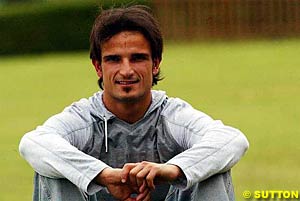 Walking through the store Liuzzi left a wake of people staring, not because he is famous, but because there is something about his aura that makes people look at him. He strolled quickly, purposefully, up the stairs and through the menswear department, seemingly looking at nothing until he suddenly stopped by a pair of gold trousers on a mannequin. "This is what I need for the awards ceremony tomorrow night" he announced, standing sideways to them and nodding his head in admiration.
Walking through the store Liuzzi left a wake of people staring, not because he is famous, but because there is something about his aura that makes people look at him. He strolled quickly, purposefully, up the stairs and through the menswear department, seemingly looking at nothing until he suddenly stopped by a pair of gold trousers on a mannequin. "This is what I need for the awards ceremony tomorrow night" he announced, standing sideways to them and nodding his head in admiration.
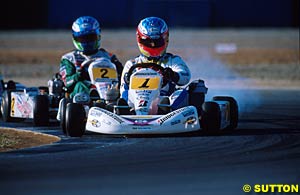 "This friend of mine brought me to the track for the first time," Liuzzi reflects, sitting down in a cafe and waiting for his juice to arrive, "and when we were there I fell in love directly with karting, from the very first time, and since the moment it went in my head I could not take it away. I forgot all the rest soccer, ski, all the other sports or hobbies I was doing. I changed my mind completely in 24 hours, and thought karting is cool!"
"This friend of mine brought me to the track for the first time," Liuzzi reflects, sitting down in a cafe and waiting for his juice to arrive, "and when we were there I fell in love directly with karting, from the very first time, and since the moment it went in my head I could not take it away. I forgot all the rest soccer, ski, all the other sports or hobbies I was doing. I changed my mind completely in 24 hours, and thought karting is cool!"
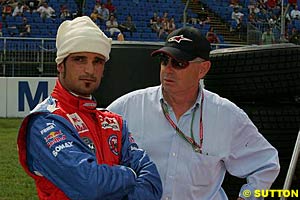 The next year, in 1997, Liuzzi was to meet the man who would change his life completely. Peter Collins, the man who talked Lotus boss Colin Chapman into giving Nigel Mansell his first chance in Formula One when he was team boss for the team before moving on to the team manager positions at Williams and Benetton and later taking over Lotus himself, giving Mika Hakkinen his first taste of the big time, was at the World Karting Championships when chance put them together.
The next year, in 1997, Liuzzi was to meet the man who would change his life completely. Peter Collins, the man who talked Lotus boss Colin Chapman into giving Nigel Mansell his first chance in Formula One when he was team boss for the team before moving on to the team manager positions at Williams and Benetton and later taking over Lotus himself, giving Mika Hakkinen his first taste of the big time, was at the World Karting Championships when chance put them together.
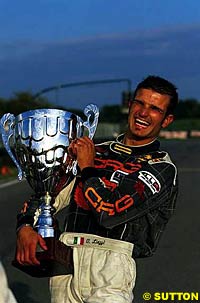 Collins tapped into his broad array of contacts and found a cheap deal to run in German Formula Renault, with Liuzzi giving the proviso that he was also able to run in the Karting World Championships at the same time, the fulfillment of a long held dream. The karting title fell to him, the crown on a long line of category and age wins, while the Renault title went down to the last race, the result of a win and a number of podiums. That final race was rancorous, a squall of ignored black flags and innuendo about the opposition's treated tyres leading to the two second a lap deficit to the remainder of the pack, but the combination of a dream satisfied and another stolen pushed the pair up the motorsport ladder.
Collins tapped into his broad array of contacts and found a cheap deal to run in German Formula Renault, with Liuzzi giving the proviso that he was also able to run in the Karting World Championships at the same time, the fulfillment of a long held dream. The karting title fell to him, the crown on a long line of category and age wins, while the Renault title went down to the last race, the result of a win and a number of podiums. That final race was rancorous, a squall of ignored black flags and innuendo about the opposition's treated tyres leading to the two second a lap deficit to the remainder of the pack, but the combination of a dream satisfied and another stolen pushed the pair up the motorsport ladder.
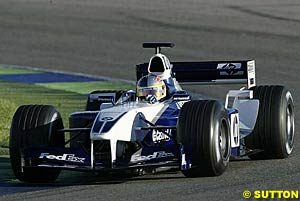 "I know it was great opportunity that Williams gave to me, but for me it was important to see that I was able to drive a Formula One car because, you know, it's not a game now sometimes it looks like a PlayStation with all the buttons on the steering wheel, but it's not so easy to drive a Formula One car well. For me it was important to see if I was able to keep the car on the track and to be quick, and at the end of the day, even if maybe I wasn't one second faster than (Juan Pablo) Montoya, I was okay I thought that I could do better, because maybe I thought a bit too much about the risk of a spin and to damage the car, but of course for me it was important to make kilometres. In Formula One if you see the limit it's really easy to see the wall, and that would have been the end of my dream on that day."
"I know it was great opportunity that Williams gave to me, but for me it was important to see that I was able to drive a Formula One car because, you know, it's not a game now sometimes it looks like a PlayStation with all the buttons on the steering wheel, but it's not so easy to drive a Formula One car well. For me it was important to see if I was able to keep the car on the track and to be quick, and at the end of the day, even if maybe I wasn't one second faster than (Juan Pablo) Montoya, I was okay I thought that I could do better, because maybe I thought a bit too much about the risk of a spin and to damage the car, but of course for me it was important to make kilometres. In Formula One if you see the limit it's really easy to see the wall, and that would have been the end of my dream on that day."
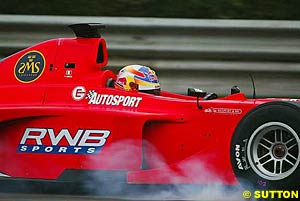 With the heat of Bjorn Wirdheim's triumph in the Championship still fresh, Arden was looking to continue the momentum, while Collins and Liuzzi were looking to step up to the title for 2004. It was a marriage made in heaven. "For sure I was the youngest of the more or less quick drivers at the beginning of the year, so I could have been one of the drivers to choose for the future. Pantano was quite old not old because of age, but because of experience in the Championship and Friesacher they didn't know (about) because he was not old, but it was already his third year of 3000. It's like hunger you can take hunger to fight for the Championship, and maybe I was a little more hungry to win, and with a really good feedback from the first season." Red Bull agreed, and the deal was the first one done for the new season.
With the heat of Bjorn Wirdheim's triumph in the Championship still fresh, Arden was looking to continue the momentum, while Collins and Liuzzi were looking to step up to the title for 2004. It was a marriage made in heaven. "For sure I was the youngest of the more or less quick drivers at the beginning of the year, so I could have been one of the drivers to choose for the future. Pantano was quite old not old because of age, but because of experience in the Championship and Friesacher they didn't know (about) because he was not old, but it was already his third year of 3000. It's like hunger you can take hunger to fight for the Championship, and maybe I was a little more hungry to win, and with a really good feedback from the first season." Red Bull agreed, and the deal was the first one done for the new season.
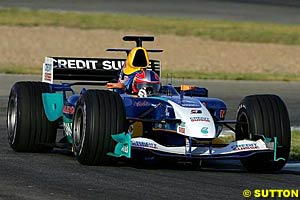 The challenge now is to turn these chats, and his unmatched Formula 3000 season, into a seat in Formula One for 2005. "I hope that someone will leave a seat to me, that someone will trust on me. I'm really happy about what Sir Frank (Williams) gave me with the test, because it was in a difficult moment in my career and they gave me such a big present; it was really important to me. And also this second present for my victory from Mr. Sauber was important to me, to see that people still believe in my potential. I'm a person who, when I believe in someone, I always give my best."
The challenge now is to turn these chats, and his unmatched Formula 3000 season, into a seat in Formula One for 2005. "I hope that someone will leave a seat to me, that someone will trust on me. I'm really happy about what Sir Frank (Williams) gave me with the test, because it was in a difficult moment in my career and they gave me such a big present; it was really important to me. And also this second present for my victory from Mr. Sauber was important to me, to see that people still believe in my potential. I'm a person who, when I believe in someone, I always give my best."
|
Contact the Author Contact the Editor |
Please Contact Us for permission to republish this or any other material from Atlas F1.
|
Volume 10, Issue 39
Atlas F1 Exclusive
Interview with Vitantonio Liuzzi
Interview with Paul Stoddart
Bjorn Wirdheim: Going Places
Ann Bradshaw: Point of View
2004 Chinese GP Review
2004 Chinese GP Review
Technical Review: China
The Confidence Trick
Stats Center
Qualifying Differentials
SuperStats
Charts Center
Columns
The F1 Insider
On the Road
Elsewhere in Racing
The Weekly Grapevine
> Homepage |